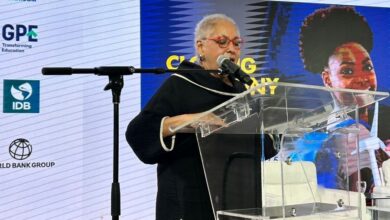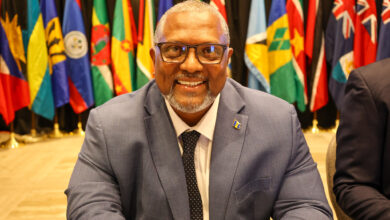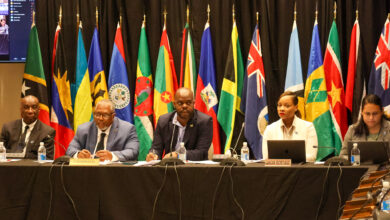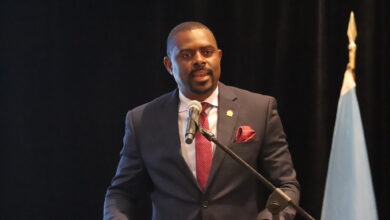(CARICOM Secretariat, Turkeyen, Greater Georgetown, Guyana) Arising from consultations held in Kingston, Jamaica, January 5-7, the Government of Haiti and representatives of the Caribbean Community (CARICOM) agreed on several key project proposals designed to strengthen Haiti’s institutional and technical capacity in three priority areas: housing and settlement development; physical and environmental planning; and infrastructure development and coordination.
The consultations brought together a high level team including representatives from the Haitian government, led by Prime Minister Jean Max Bellerive, CARICOM, the Office of the Special Representative of CARICOM for Haiti, the Caribbean Development Bank (CDB), the Organisation of American States (OAS), the Caribbean private sector led by the Caribbean Association of Industry and Commerce (CAIC), and the Haitian Diaspora Federation.
During the course of his presence in Jamaica Prime Minister Bellerive met with Jamaica’s Prime Minister Bruce Golding and appraised him of the current situation in Haiti. The Haiti Prime Minister also me with the full complement of members of the diplomatic community in Jamaica.
The consultations included technical, political and communication specialists covering a range of areas including health, housing, management construction, public administration and the media. The three-day event was convened by the CARICOM Representative for Haiti, former Prime Minister of Jamaica, P.J. Patterson, and Haitian Prime Minister Jean Max Bellerive. Reports out of the consultations indicate that the working teams have successfully identified and arrived at a consensus on the priority areas for CARICOM’s project planning support for Haiti. These include housing and shelter, debris removal, health and sanitation, education and agriculture.
A specific suite of projects has been defined and is being detailed with finalization deadlines in ninety days. The primary objective is to create comprehensive submissions designed to access funding for special projects and/or projects which have thus far been only partially funded. The submissions, once finalized, will be presented to the Interim Haitian Recovery Commission (IHRC) and other potential funding sources. This follows on an urgent appeal for assistance from Haiti to close the gap between current funding from international donor sources, that are aimed mainly at long-term projects and the need identified by the Haitian government for funding for short-term projects and the strengthening of institutional capacity. In encapsulating the need, Prime Minister Bellerive noted: “Donors are looking for and prefer projects that have long-term potential, but our immediate needs are others. Therefore, we need to look at creative ways that will encourage donors to quickly fund and implement these projects.”
The joint CARICOM and Haitian technical teams estimated that $31 million is needed to ensure that the gap in technical expertise is closed, which as Prime Minister Bellelrive added, “is a small amount in the scheme of things.”
A team of communication experts from Haiti consulted with one assembled by the Office of the Special Representative on communication interventions in support of the project initiatives. This working group agreed on a methodology for improving the flow of communication between Haiti and the Caribbean Community beginning with the commemorative activities planned to mark the first anniversary of the January 12 earthquake. The work group also drafted a model communication framework in support of urban development in Haiti.
The consultations arose out of growing concerns within Haiti and the Caribbean Community about the slow pace of the recovery programme. It has been estimated that only three percent of the funding approved by the IHRC for projects has been allocated to the Haitian Government. Prime Minister Bellerive asserted in a press conference on Thursday that the majority of the debris so far removed has been at the sole expense of the state. He reinforced a perception that debris removal was not regarded as “sexy” since once removed, there would be no lasting monument to the work that had been done as against more attractive investments such as hospital construction and highway development. He suggested that a method be identified to tie rubble removal to construction-type projects to increase its attractiveness to potential investors.
The Prime Minister’s position was echoed by the CARICOM Special Representative who affirmed: “There is no question that Haiti must quickly address its urgent challenges now, and the Caribbean community, as well as myself personally, will leave no stone unturned to make this happen. Unfortunately, many of the projects that have been funded do not represent the priorities of Haiti. As Special Representative for CARICOM and a friend of Haiti, I’m calling on the international community to amend this situation and redirect funds where they are mostly needed.”
In order that CARICOM might best assist Haiti, Mr Patterson further called for the strengthening of the CARICOM office in Haiti as well as the Office of the Special Representative in Kingston.
Among the projects proposed by the consultations, is the creation of a virtual office as an on-line portal that would link all stakeholders in the process and make information more readily available.
The private sector and the Haitian Diaspora Federation representatives also reported on their involvement in a housing expo initiative organized by the Government of Haiti to take place in Port-au-Prince, January 31 to February 3, 2011. Private sector initiatives should soon be boosted by the creation of a CARICOM fund in support of Haiti for which the Caribbean Development Bank has already indicated its support provided that the proposal emanates from the appointed Haitian representative to the CDB Board.
The technical teams are planning to meet again in two weeks to continue their work. Their goal is that, once approved, projects should go into their implementation phase. Mr. Patterson led a call for the identification and appointment of counterparts within Haiti and CARICOM who would be responsible for sharing information on their particular area of expertise and interest. This would allow for a more efficient system of collaboration and release some of the burden from both the offices of President Preval and Prime Minister Bellerive. A commitment was made by both sides to identify and appoint these key individuals within the next 15 days. Both parties also committed to improving the flow of information dispersal through electronic sources.
While acknowledging the gap in funding immediate requirements, Prime Minister Bellerive explained that significant progress has been achieved in the reconstruction efforts. He cited the reopening of 50 schools in the earthquake affected areas for the 2010 school year. Bellerive also informed the meeting that: “almost one third of those displaced are now out of the tent cities, and the one million who wait, will go home to sturdier, safer buildings than before.”
The Prime Minister added that job creation initiatives are gaining momentum, with three industrial parks already in the works in Port-au-Prince and the northern regions, which are slated to employ approximately 100,000 Haitians. “The Haitian government is working diligently and tirelessly to advance reconstruction and recovery efforts on all fronts. We thank our friends in the Caribbean community and Mr. Patterson especially, for their efforts and generous support.”
Stakeholders present at the consultations agreed that the consultations were a watershed moment in advancing collaboration between Haiti and the Caribbean Community.
Contact: Office of the CARICOM Special Representative for Haiti
Kingston, Jamaica; (876) 929-5701;





